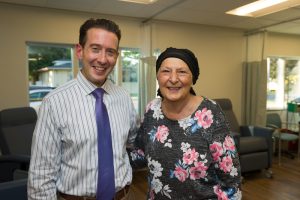
Early Signs of Inflammatory Breast Cancer
Regional Cancer Care Associates (RCCA) provides comprehensive treatment of cancer and blood disorders to patients throughout New Jersey, Connecticut, Maryland, and the Washington, DC, area.
HIPAA Alert: Potential Data Breach Learn More
Questions on Oncology, Hematology and/or Infusion Clinical Services due to COVID-19 Crisis – CALL 833-698-1623
Important Information for Our Patients Regarding the Coronavirus.
RCCA Providing Area Cancer Patients with Access to Care During Coronavirus Outbreak
RCCA Offering Patients Virtual Visits During Coronavirus Pandemic
American women have a 1 in 8 chance of getting breast cancer sometime during their life. Nearly a quarter million new, positive diagnoses of the disease will occur in the U.S. this year. The good news is breast cancer treatments and pharmaceuticals have dramatically improved in recent years, and new ones continue to emerge. Still, the basic guidance remains the same; early detection is key, as is knowing hereditary factors and warning signs that lead to a prompt diagnosis and successful treatment. During this October for Breast Cancer Awareness Month, consider these reminders for awareness and prevention.
Knowing if a relative had breast cancer is vital since family history plays such a significant role in incidence rate. Find out if at all possible. Knowledge of personal medical history also is crucial. For example, oncologists report women with cancer in one breast are at increased risk for the disease in the other. Dense breast tissue increases disease risk, as does not having children or bearing a first child after age 30. Oral contraceptive use, alcohol consumption, and becoming overweight after menopause may increase risk slightly. Finally, breast cancer susceptibility rises with age, with White women generally at higher risk than Black, Hispanic, Asian, and Native-American women.
Thanks to regular screening mammography, radiologists and oncologists are spotting more breast cancer early before outward signs appear. Knowledgeable patients also play a fundamental role by paying attention to common warning signs and seeking medical help promptly. Signs and symptoms include:
Make an appointment with your physician or nearby cancer center should any of these issues arise. Don’t delay.
For more information or to schedule an appointment,
call 844-346-7222. You can also schedule an appointment by calling the RCCA location nearest you.

Regional Cancer Care Associates (RCCA) provides comprehensive treatment of cancer and blood disorders to patients throughout New Jersey, Connecticut, Maryland, and the Washington, DC, area.

When people think of breast cancer, they generally think of it affecting women. However, in rare circumstances, breast cancer can affect men, most commonly in

First diagnosed with breast cancer in 1992, she has persevered in her battle against the disease for more than 30 years.

Regional Cancer Care Associates is one of fewer than 200 medical practices in the country selected to participate in the Oncology Care Model (OCM); a recent Medicare initiative aimed at improving care coordination and access to and quality of care for Medicare beneficiaries undergoing chemotherapy treatment.